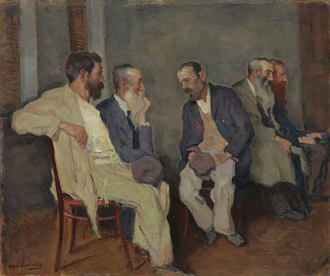“The Conversation” (circa 1935), by Arnold Lakhovsky,Marla Durben Hirsch writes in a FierceHealthcare piece that despite all the hoopla about electronic health records and the general digital delirium we’re all in, there’s no substitute for clinicians to have real conversations with each other and patients. With such new advances as bundled payments, this will remain just as important as it has always been.
As an example of the EHR benefits she cited, regarding a Vanderbilt University study:
“The researchers compared a typical process map for a high-risk situation (discharge from a cardiac unit) to the information in an EHR and discovered that the EHR provided more detailed information than the regular process map. For instance, it provided information from sub-processes, such as EHR notes, orders and forms, and identified 12 additional provider types involved in the cardiac unit. Moreover, 35 percent of providers involved in care on the unit were ‘unexpected’ in the process. All of this additional input into the analysis would be helpful in the quality improvement activities and ultimate patient safety efforts.”
She added: “We’ve known for years that the data in EHRs can be used for a multitude of secondary uses, such as research into identifying at-risk patients, determining who would be well suited to participate in clinical trials and the like.
“These new studies point to even more opportunities to harness EHR data in new ways to improve clinical care and patient safety.”
“But why did it take an EHR to unearth some of this information? Why did it take an EHR to determine that there are more providers involved in discharging patients from an inpatient cardio unit than first expected? Why did it take an EHR to uncover that the same providers, whether by specialty, personal relationships, or being scheduled in a hospital at the same time, end up informally working together to coordinate care?”
“Why not simply ask?
- ‘Hey, are there any other staff members that we should include in our analysis of risks on this cardio unit?’
- ‘How did that provider end up providing care here?’
- ‘Are there particular clinicians you seem to end up working with regularly when coordinating care in our hospital? Should we designate the three of you a team to make patient care easier?”’
To read the report from the Vanderbilt researchers, please hit this link.
To read Ms. Hirsch’s essay, please hit this link.




